Unit 8 Pets Grammer 课件(共60张PPT)
文档属性
| 名称 | Unit 8 Pets Grammer 课件(共60张PPT) | 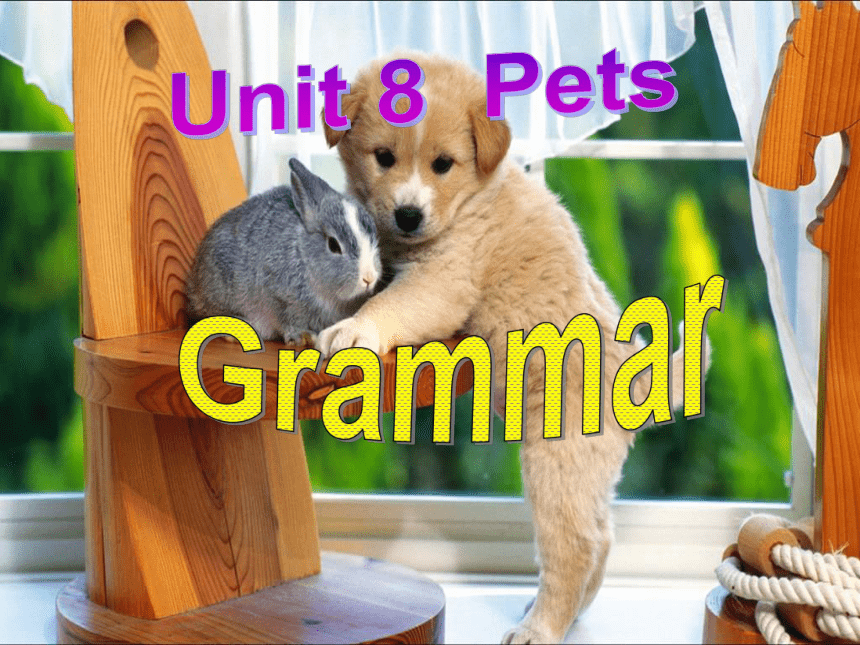 | |
| 格式 | ppt | ||
| 文件大小 | 2.5MB | ||
| 资源类型 | 教案 | ||
| 版本资源 | 牛津译林版 | ||
| 科目 | 英语 | ||
| 更新时间 | 2022-06-08 09:55:13 | ||
图片预览

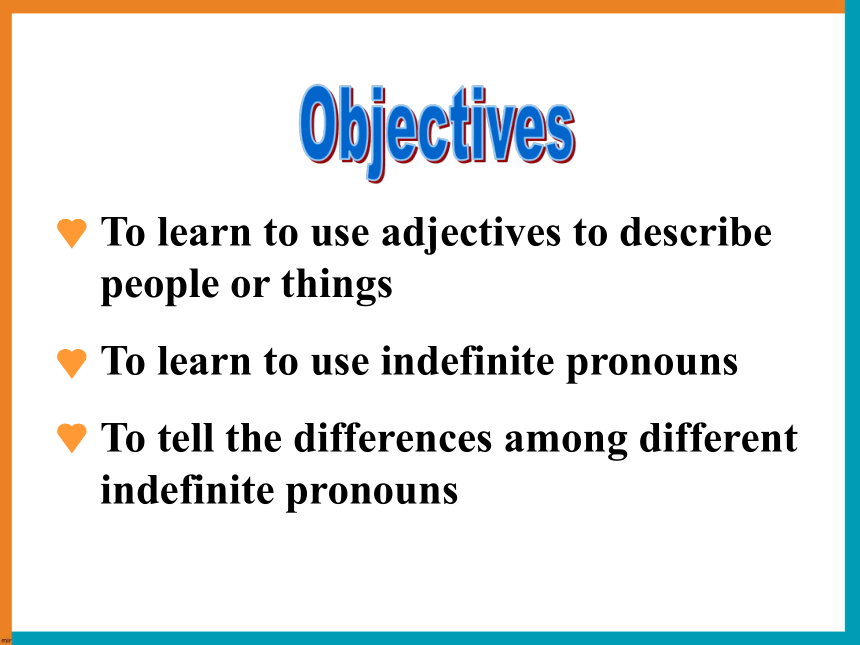

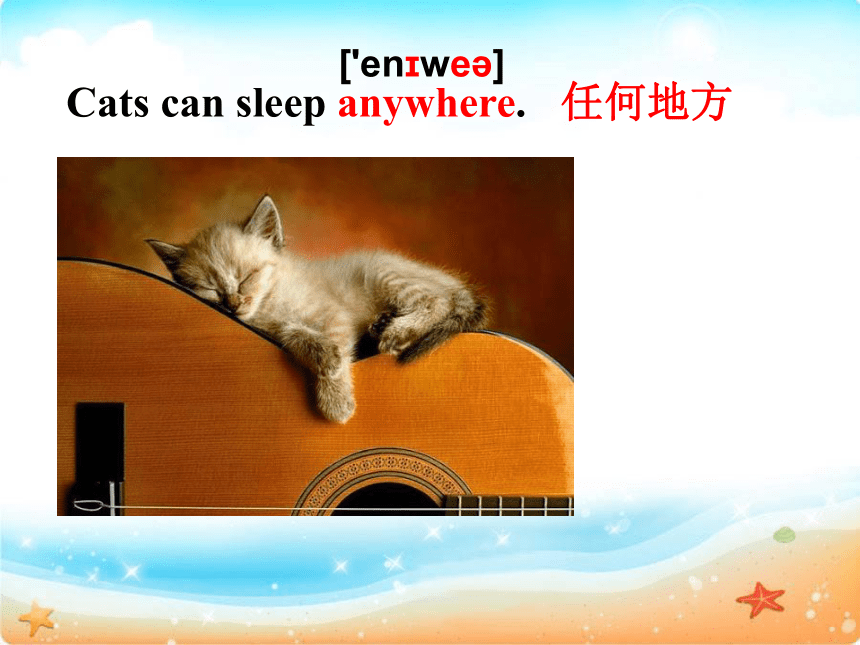

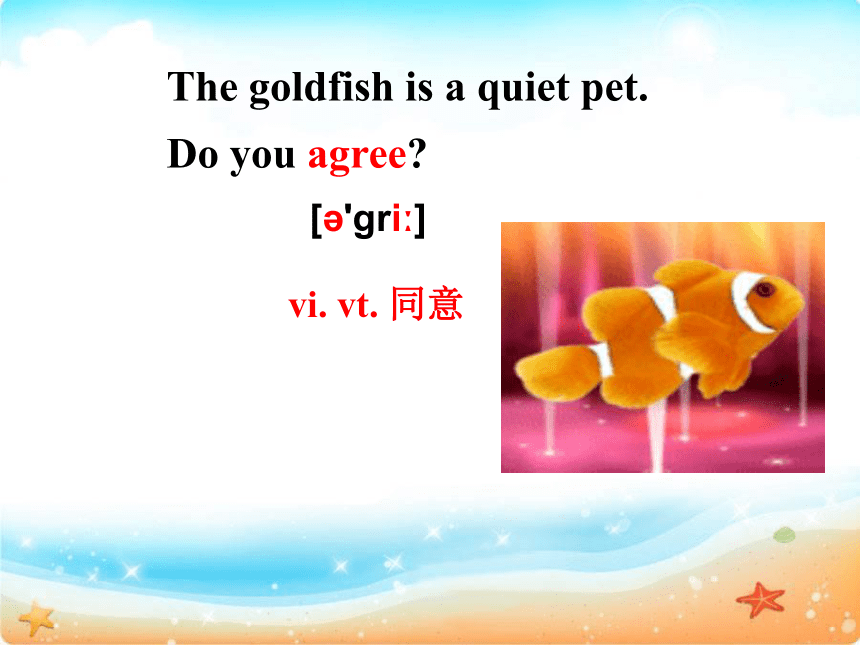
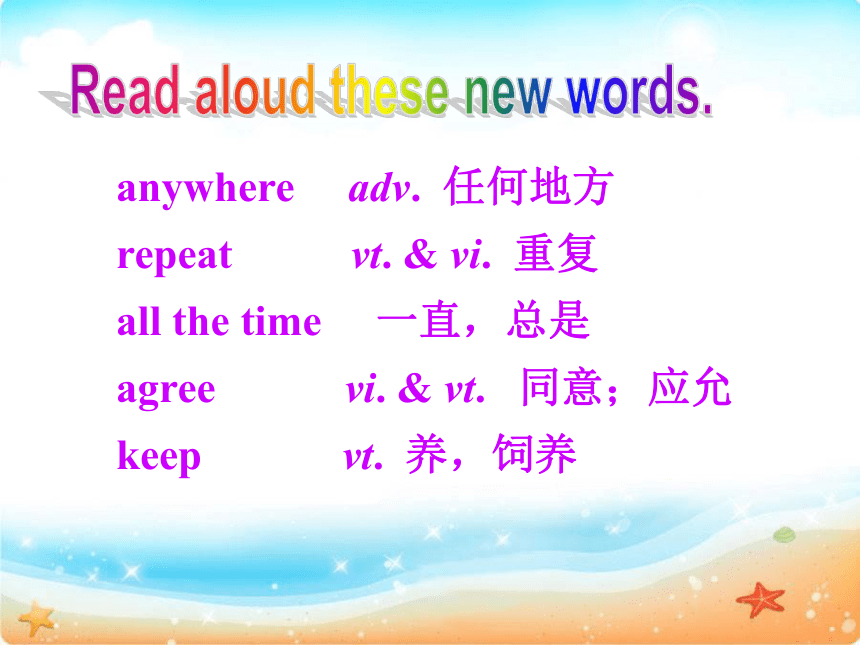
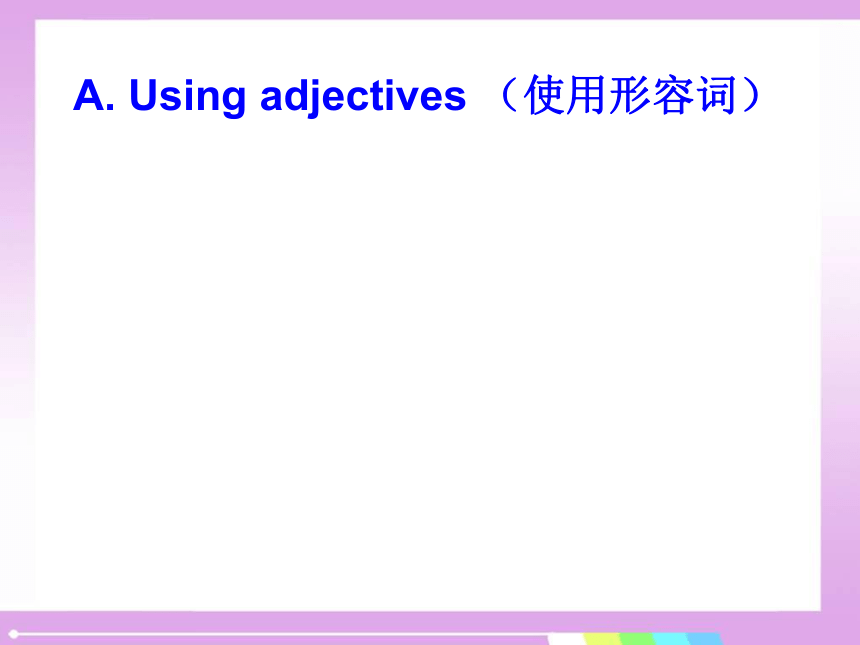
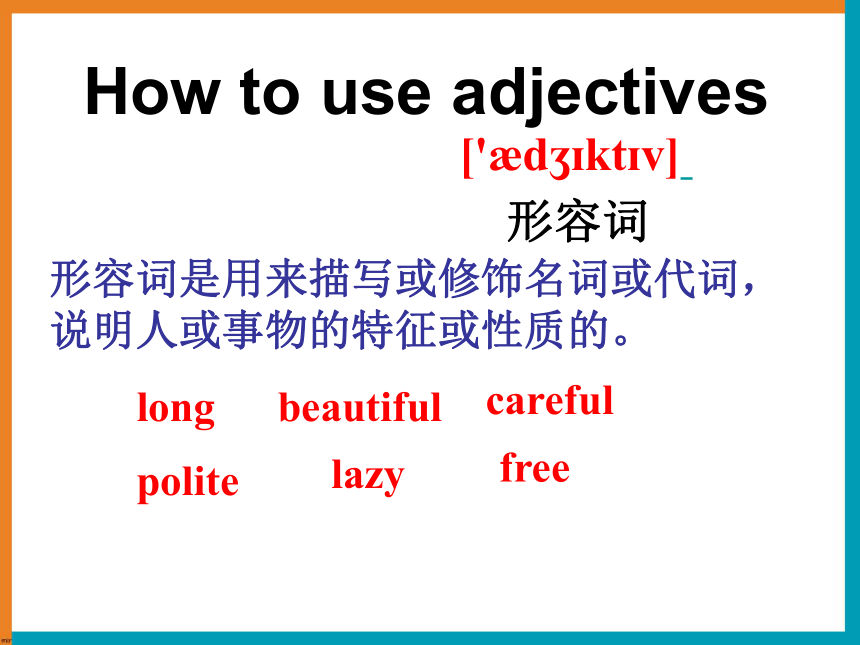
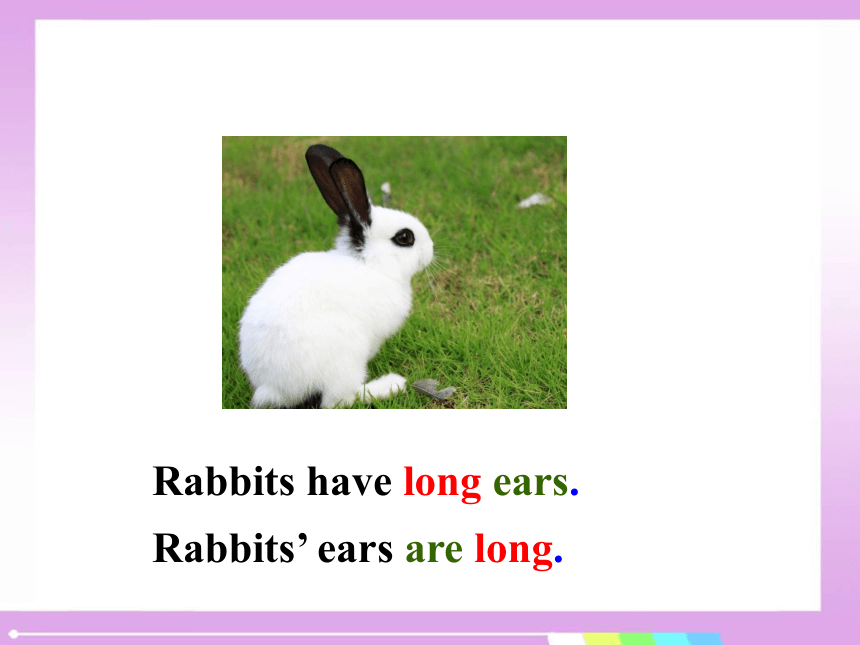
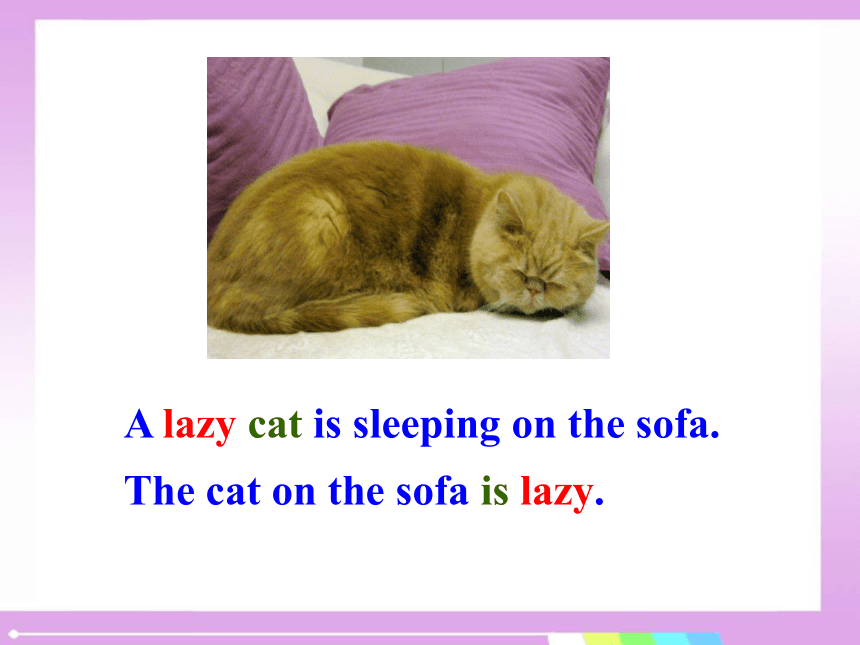
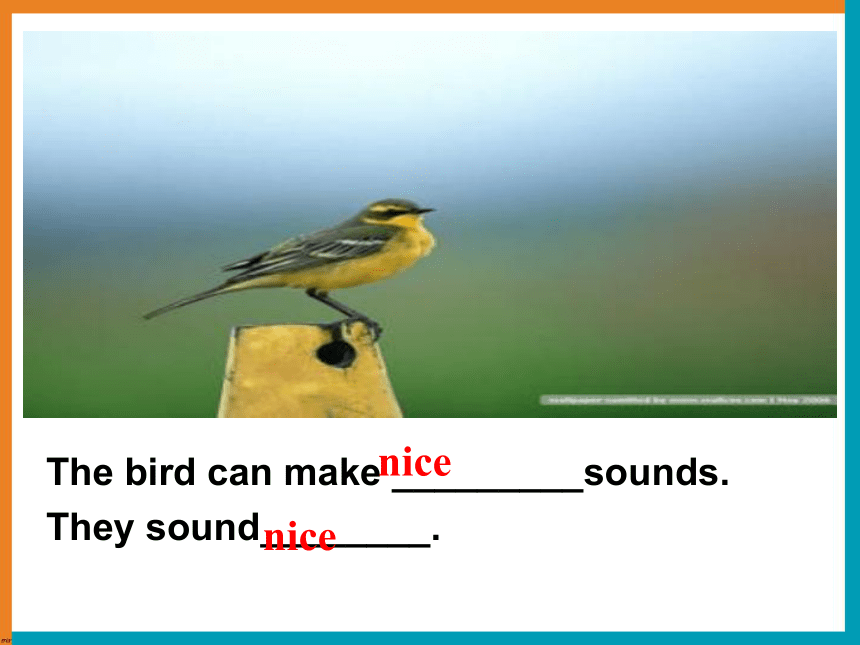
文档简介
(共60张PPT)
To learn to use adjectives to describe people or things
To learn to use indefinite pronouns
To tell the differences among different indefinite pronouns
She keeps a dog as a pet and takes him all the time.
always
[ki p]
vt. 养,饲养
一直,总是
=
Cats can sleep anywhere.
任何地方
['en we ]
This parrot always repeats the same word.
vt. & vi. 重复
Hello! Hello! Hello! …
[r 'pi t]
The goldfish is a quiet pet.
Do you agree
vi. vt. 同意
[ 'gri ]
anywhere adv. 任何地方
repeat vt. & vi. 重复
all the time 一直,总是
agree vi. & vt. 同意;应允
keep vt. 养,饲养
A. Using adjectives (使用形容词)
How to use adjectives
形容词是用来描写或修饰名词或代词,说明人或事物的特征或性质的。
[' d kt v]
形容词
long
lazy
beautiful
polite
free
careful
Rabbits have long ears.
Rabbits’ ears are long.
A lazy cat is sleeping on the sofa.
The cat on the sofa is lazy.
The bird can make _________sounds.
They sound________.
nice
nice
There are five_________ dogs on the sofa.
The dogs on the sofa look ________.
cute/friendly
cute/friendly
We can see two ____________ goldfish.
Goldfish are ________.
Goldfish are easy to look after.
beautiful/quiet
beautiful/quiet
Rabbits has _____ ears.
A _____ cat is sleeping on the sofa.
The bird can make ____
sounds.
nice
There are five_____ dogs on the sofa.
cute
lazy
adjective + noun(名词)
long
The cat on the sofa is ____.
lazy
The bird sounds_____.
nice
The dogs on the sofa look
____.
cute
The fish smell____.
a linking verb(系动词)+ adjective
bad
Choose one of the animals to describe.
我们用形容词来描述人或物。我们可以将形容词放在名词前或放在连系动词后。
★ We use adjectives to describe people or things. We can put an adjective before a noun or after a linking verb.
We put an adjective:
linking verbs系动词
be feel look taste smell sound keep get become turn
_________a noun(名词) or
___________a linking verb(系动词).
before
after
形容词的用法
形容词是用来描述人或事物的
用法: 1. 作定语
1) This is an old house.
2) Is there anything wrong with your bike
2. 作表语
1) He is very clever
2) She felt a little ill.
3) Leaves turn yellow in autumn.
除be动词外,系动词还包括become、feel、get、
look、seem、smell、sound、taste、turn等,
这些词后常接形容词作表语
(放在n.前,不定pron.之后)
(放在系动词之后)
1. make/ Birds/sounds/ nice
___________________________
2. are/ clever/ Dogs/ and / friendly ___________________________
3. and/ quiet/ Goldfish/ look after/ to / are/ easy
__________________________________
Birds make nice sounds.
Dogs are clever and friendly.
Goldfish are quiet and easy to look after.
A1. Talking about pets with the words below.
I have a _____ cat. She likes to run after balls. When she gets _____, she sleeps anywhere. She miaows when she is ______.
My parrot is a ______ friend of mine. He is very _____, and he can repeat my words. He says “Hello!” when I come back home. He is _____ all the time.
black
black clever happy hungry special tired
tired
hungry
special
clever
happy
A2. Help Daniel complete his article.
Sentences from this unit:
Please bring me something to eat.
当我们不知道或没有必要说明所谈论的人是谁或是什么事物时,我们就用不定代词来指代人或物。
B. Indefinite pronouns (不定代词)
★ We use indefinite pronouns to refer to people and things when we do not know or do not need to mention who or what we are talking about.
不定代词
代替或修饰不特指的人或事物的代词叫不定代词。
some, any, every, no都能和one, body, thing一起构成代词,这些代词叫复合不定代词。它们基本含义为:
somebody、someone
某人
anybody、anyone
某人/任何人
everybody、everyone
每个人
nobody、no one
没有人
指人:
指物
something
某物
anything
某物/任何物
everything
每件事,一切
nothing
没事
B. someone/somebody, anyone/ anybody and no one/nobody
There is someone/somebody in next room. (改为否定句)
Three isn’t anyone/anybody in next room.
=There is no one/nobody in the classroom.
(改一般疑问句)
Is there anyone/anybody in the next room
I saw ___________________ (有人) in the house.
How to use indefinite pronouns
somebody (=someone)
There is ____________ (某个东西)under the bed.
something
We use somebody, someone and something in positive sentences.
When we are offering something or when we expect the answer to be ‘yes’, we can use something, somebody/ someone in questions.
Would you like something to eat
Is someone there
I did not see _________________(有人)in the house.
anybody (=anyone)
There is not ________(某个东西)under the bed.
anything
We use anybody, anyone and anything in negative sentences or in questions.
Do you feed your goldfish ________(某物)else?
anything
There is ________________(没人)in the living room.
nobody (= no one)
I saw _______(没东西)in the fridge.
nothing
We use nobody, no one and nothing to refer to ‘not anyone’ and ‘not anything’.
There isn’t anybody in the room.
= There is _____________ in the room.
I did not hear anything. = I heard _______.
nobody/no one
nothing
Is _________________ (每个人) here today
__________ (每样东西) is ready.
everybody/everyone
Everything
We use everybody, everyone and everything to refer to ‘all people’ and ‘all things’.
Mr Hu is asking the students about their plete their conversation with the correct indefinite pronouns.
Mr Wu: Millie, I know you have a dog. What do you feed him
Millie: We usually give him dog food.
Mr Wu: Do you feed him ________ else
Millie: Yes. Sometimes we give him some meat. He likes it.
Mr Wu: I see. Does ________________ have a cat
Amy: Yes, I have a cat. She’s nice to _____________________.
Mr Wu: Good. I know _________________ has goldfish, right
anything
anyone (anybody)
everybody (everyone)
somebody (someone)
Peter: Yes, I do. Goldfish are easy to look after.
Mr Wu: That’s true. Does ______________ have a snake
Kitty: No. _______________ wants a snake, I think.
Daniel: I don’t agree. There’s _______ wrong with keeping a snake if you like it.
nothing
anyone (anybody)
Nobody (no one)
1. 我们用 someone/somebody 在_____句,用于指代 ________.
anyone/anybody 用于____________句 也指代_______.
no one/nobody 指_______.
Summary
肯定
某人
否定或疑问
某人
没有人
C. something, anything, nothing and none
Millie has something in her hands.
(改否定)
Millie doesn’t have anything in her hands.
= Millie has nothing in her hands.
(改一般疑问句)
Does Millie have anything in her hands
1. Something, anything, nothing 用于指代________.
2. Something 用于 ______句 ,而 anything用于_____________句。
3 nothing 指________.
Summary
某事物
肯定
否定或疑问
没有东西
D 当我们 用 everybody/everyone , 指“每个人”,用everything指“每件事,一切”可用于任何句式。
e.g. Is everybody/everyone here
Everything is ready.
用不定代词填空
---What a big box! Can I help you --- No, thanks. There’s _______ in it.
It’s empty(空的).
nothing
3. --- There’s _________ wrong with my clock. It doesn’t work. --- Don’t worry. Let me have a look.
4. --- ____________ is in the classroom.
Where are they --- They are all on the playground.
5. --- How easy the Maths exam was! --- Yes. But I don’t think ________
could pass it.
something
No one/Nobody
everyone
注:
★ 形容词修饰复合不定代词时,通常要位于不定代词的后面。
Is there anything important in today’s newspaper
今天的报纸上有什么重要的新闻吗?
★ 复合不定代词作主语时,谓语动词通常用单数。
Everything is ready. 一切都准备好了。
Nobody likes to join in this activity.
没人愿意参加这一活动。
Mrs Brown is kind. Every day she
tries to cook ______ for me during my
stay in Canada.
A. something nice
B. anything nice
C. nice something
D . nice anything
形容词
定义 用来表示人或事物特征、性质的词。
用法 1. 放在名词前(作定语)。 2. 放在连系动词后(作表语)。
举例 It’s a nice gift. He is very friendly.
You look tired today.
一、使用形容词
指人 somebody/someone anybody/ anyone nobody/ no one everybody/ everyone
指物 something anything nothing everything
用法 用肯定句以及表示期待对方给予肯定回答的问句中。 用于否定句、疑问句以及表示强调的肯定句中。 在句中用来表示否定,相当于not any- 表示所有的人或物。
注意 1. 所有不定代作主语时谓语动词用单数形式
2. 形容词修饰不定代词时,形容词要后置。
二、不定代词:用来指不定数量或范围的人或物。
1. Someone _____ (want) to see you at the school gate.
2. There __ (be) nothing wrong with the car.
3. Mother will buy me _________ ____ (好吃的东西) this afternoon.
4. How is __________ (一切) going
5. She eats nothing in the morning.
= She ______ ___ ________ in the morning.
wants
is
something nice
everything
doesn’t eat anything
Useful phrases
1. make nice sounds
2. be easy to look after
3. get tired
4. sleep everywhere
5. a special friend of mine
6. repeat my words
7. come back home
8. all the time
9. There is nobody/no one in the house.
10. Is everybody/everyone here today
11. Everything is ready.
12. anything else
发出美丽的声音
容易照看
变累
回到家
一直,总是
今天大家都到了吗?
房子里没人
一切准备好了
任何别的东西
重复我的话
我的一位特殊的朋友
睡在任何地方
我不同意
养蛇是没有什么问题的
13. I don’t agree.
14. There is nothing wrong with keeping a snake.
1. There is not ________ (something) in the box.
2. I’m glad to see that _________ (somebody) is here today.
3. _______ (anything) is difficult if you put your heart into it.
4. People in the shop are _______ (friend) to us.
5. My dog is the _______ (clever) animal of all.
一、用所给词的适当形式填空。
anything
everybody
Nothing
friendly
cleverest
1. Hello, e________!
2. I can tell s_________ about Millie and
her classmates.
3. … she’s going to ask s________ to fix it.
4. Can you find a______ to help you with
your homework
5. There’s s_________ wrong with my
computer.
everyone
something
someone
anyone
something
6. Is there a_______ wrong with your
fridge
7. Hi, e_________!
8. They turned around but saw n______.
“Is a_______ there ” Millie asked.
N______ replied.
9. Then she told Andy e_________.
10. Please bring me s_________ to eat.
anything
everybody
nothing
anybody
Nobody
everything
something
Mrs Brown is kind. Every day she
tries to cook ______ for me during my
stay in Canada.
A. something nice
B. anything nice
C. nice something
D . nice anything
1. — Who helped you clean the classroom
yesterday
— ______. I cleaned it all by myself.
A. Somebody B. Nobody
C. Everybody
2. — Can I have some more ice cream, Mum
— Sorry. There is ______ left in the fridge.
A. none B. nothing
C. no one D. anything
9. — Have you bought ______ for
Linda’s birthday
— Not exactly. Just some flowers.
(2012江苏连云港)
A. something unusual
B. anything unusual
C. unusual something
D. unusual anything
10. --- How is Helen in the new school
--- She is doing very well. There is
______ to worry about. (2012安徽)
A. something B. anything
C. nothing D. everything
11. When the Greens moved into the
house last week, ______ was in a mess (乱七八糟), so they did a
big cleaning. (2012湖北武汉)
A. something B. everything
C. anything D. nothing
12. I think ______ can make Andy change
his mind. He is such a person who
never gives up easily. (2012江苏南京)
A. something B. anything
C. nothing D. everything
13. ______ went hiking (徒步旅行) last
weekend because of the bad weather.
(2012山东滨州)
A. Someone B. No one
C. Everyone D. Nothing
14. Lincoln came from nothing, yet he
did ______ that changed the world.
(2012山东潍坊)
A. something B. nothing
C. everything D. anything
15. — What else do you need for your
trip
— ______ else. I’ve packed
everything. (2012湖南岳阳)
A. Something B. Everything
C. Nothing
1. Hobo叫Eddie不要对他不礼貌。
Hobo asks Eddie not to _______ to him.
2. 我的狗是我的一位特殊朋友。
My dog is a ___________________.
3. 金鱼很容易照看。
Goldfish are ________________.
4. 如果你喜欢,养蛇也没什么不对。
There’s _______ wrong with _______ _______ if you like.
special friend of mine
be rude
easy to look after
a snake
nothing
keeping
二、翻译
We use adjectives to describe people or things. We can put an adjective before a noun or after a linking verb.
We use indefinite pronouns to refer to people or things when we do not know or do not need to mention who or what we are talking about.
Remember the use of adjectives and the indefinite pronouns.
Preview the new words in the next lesson.
Homework
To learn to use adjectives to describe people or things
To learn to use indefinite pronouns
To tell the differences among different indefinite pronouns
She keeps a dog as a pet and takes him all the time.
always
[ki p]
vt. 养,饲养
一直,总是
=
Cats can sleep anywhere.
任何地方
['en we ]
This parrot always repeats the same word.
vt. & vi. 重复
Hello! Hello! Hello! …
[r 'pi t]
The goldfish is a quiet pet.
Do you agree
vi. vt. 同意
[ 'gri ]
anywhere adv. 任何地方
repeat vt. & vi. 重复
all the time 一直,总是
agree vi. & vt. 同意;应允
keep vt. 养,饲养
A. Using adjectives (使用形容词)
How to use adjectives
形容词是用来描写或修饰名词或代词,说明人或事物的特征或性质的。
[' d kt v]
形容词
long
lazy
beautiful
polite
free
careful
Rabbits have long ears.
Rabbits’ ears are long.
A lazy cat is sleeping on the sofa.
The cat on the sofa is lazy.
The bird can make _________sounds.
They sound________.
nice
nice
There are five_________ dogs on the sofa.
The dogs on the sofa look ________.
cute/friendly
cute/friendly
We can see two ____________ goldfish.
Goldfish are ________.
Goldfish are easy to look after.
beautiful/quiet
beautiful/quiet
Rabbits has _____ ears.
A _____ cat is sleeping on the sofa.
The bird can make ____
sounds.
nice
There are five_____ dogs on the sofa.
cute
lazy
adjective + noun(名词)
long
The cat on the sofa is ____.
lazy
The bird sounds_____.
nice
The dogs on the sofa look
____.
cute
The fish smell____.
a linking verb(系动词)+ adjective
bad
Choose one of the animals to describe.
我们用形容词来描述人或物。我们可以将形容词放在名词前或放在连系动词后。
★ We use adjectives to describe people or things. We can put an adjective before a noun or after a linking verb.
We put an adjective:
linking verbs系动词
be feel look taste smell sound keep get become turn
_________a noun(名词) or
___________a linking verb(系动词).
before
after
形容词的用法
形容词是用来描述人或事物的
用法: 1. 作定语
1) This is an old house.
2) Is there anything wrong with your bike
2. 作表语
1) He is very clever
2) She felt a little ill.
3) Leaves turn yellow in autumn.
除be动词外,系动词还包括become、feel、get、
look、seem、smell、sound、taste、turn等,
这些词后常接形容词作表语
(放在n.前,不定pron.之后)
(放在系动词之后)
1. make/ Birds/sounds/ nice
___________________________
2. are/ clever/ Dogs/ and / friendly ___________________________
3. and/ quiet/ Goldfish/ look after/ to / are/ easy
__________________________________
Birds make nice sounds.
Dogs are clever and friendly.
Goldfish are quiet and easy to look after.
A1. Talking about pets with the words below.
I have a _____ cat. She likes to run after balls. When she gets _____, she sleeps anywhere. She miaows when she is ______.
My parrot is a ______ friend of mine. He is very _____, and he can repeat my words. He says “Hello!” when I come back home. He is _____ all the time.
black
black clever happy hungry special tired
tired
hungry
special
clever
happy
A2. Help Daniel complete his article.
Sentences from this unit:
Please bring me something to eat.
当我们不知道或没有必要说明所谈论的人是谁或是什么事物时,我们就用不定代词来指代人或物。
B. Indefinite pronouns (不定代词)
★ We use indefinite pronouns to refer to people and things when we do not know or do not need to mention who or what we are talking about.
不定代词
代替或修饰不特指的人或事物的代词叫不定代词。
some, any, every, no都能和one, body, thing一起构成代词,这些代词叫复合不定代词。它们基本含义为:
somebody、someone
某人
anybody、anyone
某人/任何人
everybody、everyone
每个人
nobody、no one
没有人
指人:
指物
something
某物
anything
某物/任何物
everything
每件事,一切
nothing
没事
B. someone/somebody, anyone/ anybody and no one/nobody
There is someone/somebody in next room. (改为否定句)
Three isn’t anyone/anybody in next room.
=There is no one/nobody in the classroom.
(改一般疑问句)
Is there anyone/anybody in the next room
I saw ___________________ (有人) in the house.
How to use indefinite pronouns
somebody (=someone)
There is ____________ (某个东西)under the bed.
something
We use somebody, someone and something in positive sentences.
When we are offering something or when we expect the answer to be ‘yes’, we can use something, somebody/ someone in questions.
Would you like something to eat
Is someone there
I did not see _________________(有人)in the house.
anybody (=anyone)
There is not ________(某个东西)under the bed.
anything
We use anybody, anyone and anything in negative sentences or in questions.
Do you feed your goldfish ________(某物)else?
anything
There is ________________(没人)in the living room.
nobody (= no one)
I saw _______(没东西)in the fridge.
nothing
We use nobody, no one and nothing to refer to ‘not anyone’ and ‘not anything’.
There isn’t anybody in the room.
= There is _____________ in the room.
I did not hear anything. = I heard _______.
nobody/no one
nothing
Is _________________ (每个人) here today
__________ (每样东西) is ready.
everybody/everyone
Everything
We use everybody, everyone and everything to refer to ‘all people’ and ‘all things’.
Mr Hu is asking the students about their plete their conversation with the correct indefinite pronouns.
Mr Wu: Millie, I know you have a dog. What do you feed him
Millie: We usually give him dog food.
Mr Wu: Do you feed him ________ else
Millie: Yes. Sometimes we give him some meat. He likes it.
Mr Wu: I see. Does ________________ have a cat
Amy: Yes, I have a cat. She’s nice to _____________________.
Mr Wu: Good. I know _________________ has goldfish, right
anything
anyone (anybody)
everybody (everyone)
somebody (someone)
Peter: Yes, I do. Goldfish are easy to look after.
Mr Wu: That’s true. Does ______________ have a snake
Kitty: No. _______________ wants a snake, I think.
Daniel: I don’t agree. There’s _______ wrong with keeping a snake if you like it.
nothing
anyone (anybody)
Nobody (no one)
1. 我们用 someone/somebody 在_____句,用于指代 ________.
anyone/anybody 用于____________句 也指代_______.
no one/nobody 指_______.
Summary
肯定
某人
否定或疑问
某人
没有人
C. something, anything, nothing and none
Millie has something in her hands.
(改否定)
Millie doesn’t have anything in her hands.
= Millie has nothing in her hands.
(改一般疑问句)
Does Millie have anything in her hands
1. Something, anything, nothing 用于指代________.
2. Something 用于 ______句 ,而 anything用于_____________句。
3 nothing 指________.
Summary
某事物
肯定
否定或疑问
没有东西
D 当我们 用 everybody/everyone , 指“每个人”,用everything指“每件事,一切”可用于任何句式。
e.g. Is everybody/everyone here
Everything is ready.
用不定代词填空
---What a big box! Can I help you --- No, thanks. There’s _______ in it.
It’s empty(空的).
nothing
3. --- There’s _________ wrong with my clock. It doesn’t work. --- Don’t worry. Let me have a look.
4. --- ____________ is in the classroom.
Where are they --- They are all on the playground.
5. --- How easy the Maths exam was! --- Yes. But I don’t think ________
could pass it.
something
No one/Nobody
everyone
注:
★ 形容词修饰复合不定代词时,通常要位于不定代词的后面。
Is there anything important in today’s newspaper
今天的报纸上有什么重要的新闻吗?
★ 复合不定代词作主语时,谓语动词通常用单数。
Everything is ready. 一切都准备好了。
Nobody likes to join in this activity.
没人愿意参加这一活动。
Mrs Brown is kind. Every day she
tries to cook ______ for me during my
stay in Canada.
A. something nice
B. anything nice
C. nice something
D . nice anything
形容词
定义 用来表示人或事物特征、性质的词。
用法 1. 放在名词前(作定语)。 2. 放在连系动词后(作表语)。
举例 It’s a nice gift. He is very friendly.
You look tired today.
一、使用形容词
指人 somebody/someone anybody/ anyone nobody/ no one everybody/ everyone
指物 something anything nothing everything
用法 用肯定句以及表示期待对方给予肯定回答的问句中。 用于否定句、疑问句以及表示强调的肯定句中。 在句中用来表示否定,相当于not any- 表示所有的人或物。
注意 1. 所有不定代作主语时谓语动词用单数形式
2. 形容词修饰不定代词时,形容词要后置。
二、不定代词:用来指不定数量或范围的人或物。
1. Someone _____ (want) to see you at the school gate.
2. There __ (be) nothing wrong with the car.
3. Mother will buy me _________ ____ (好吃的东西) this afternoon.
4. How is __________ (一切) going
5. She eats nothing in the morning.
= She ______ ___ ________ in the morning.
wants
is
something nice
everything
doesn’t eat anything
Useful phrases
1. make nice sounds
2. be easy to look after
3. get tired
4. sleep everywhere
5. a special friend of mine
6. repeat my words
7. come back home
8. all the time
9. There is nobody/no one in the house.
10. Is everybody/everyone here today
11. Everything is ready.
12. anything else
发出美丽的声音
容易照看
变累
回到家
一直,总是
今天大家都到了吗?
房子里没人
一切准备好了
任何别的东西
重复我的话
我的一位特殊的朋友
睡在任何地方
我不同意
养蛇是没有什么问题的
13. I don’t agree.
14. There is nothing wrong with keeping a snake.
1. There is not ________ (something) in the box.
2. I’m glad to see that _________ (somebody) is here today.
3. _______ (anything) is difficult if you put your heart into it.
4. People in the shop are _______ (friend) to us.
5. My dog is the _______ (clever) animal of all.
一、用所给词的适当形式填空。
anything
everybody
Nothing
friendly
cleverest
1. Hello, e________!
2. I can tell s_________ about Millie and
her classmates.
3. … she’s going to ask s________ to fix it.
4. Can you find a______ to help you with
your homework
5. There’s s_________ wrong with my
computer.
everyone
something
someone
anyone
something
6. Is there a_______ wrong with your
fridge
7. Hi, e_________!
8. They turned around but saw n______.
“Is a_______ there ” Millie asked.
N______ replied.
9. Then she told Andy e_________.
10. Please bring me s_________ to eat.
anything
everybody
nothing
anybody
Nobody
everything
something
Mrs Brown is kind. Every day she
tries to cook ______ for me during my
stay in Canada.
A. something nice
B. anything nice
C. nice something
D . nice anything
1. — Who helped you clean the classroom
yesterday
— ______. I cleaned it all by myself.
A. Somebody B. Nobody
C. Everybody
2. — Can I have some more ice cream, Mum
— Sorry. There is ______ left in the fridge.
A. none B. nothing
C. no one D. anything
9. — Have you bought ______ for
Linda’s birthday
— Not exactly. Just some flowers.
(2012江苏连云港)
A. something unusual
B. anything unusual
C. unusual something
D. unusual anything
10. --- How is Helen in the new school
--- She is doing very well. There is
______ to worry about. (2012安徽)
A. something B. anything
C. nothing D. everything
11. When the Greens moved into the
house last week, ______ was in a mess (乱七八糟), so they did a
big cleaning. (2012湖北武汉)
A. something B. everything
C. anything D. nothing
12. I think ______ can make Andy change
his mind. He is such a person who
never gives up easily. (2012江苏南京)
A. something B. anything
C. nothing D. everything
13. ______ went hiking (徒步旅行) last
weekend because of the bad weather.
(2012山东滨州)
A. Someone B. No one
C. Everyone D. Nothing
14. Lincoln came from nothing, yet he
did ______ that changed the world.
(2012山东潍坊)
A. something B. nothing
C. everything D. anything
15. — What else do you need for your
trip
— ______ else. I’ve packed
everything. (2012湖南岳阳)
A. Something B. Everything
C. Nothing
1. Hobo叫Eddie不要对他不礼貌。
Hobo asks Eddie not to _______ to him.
2. 我的狗是我的一位特殊朋友。
My dog is a ___________________.
3. 金鱼很容易照看。
Goldfish are ________________.
4. 如果你喜欢,养蛇也没什么不对。
There’s _______ wrong with _______ _______ if you like.
special friend of mine
be rude
easy to look after
a snake
nothing
keeping
二、翻译
We use adjectives to describe people or things. We can put an adjective before a noun or after a linking verb.
We use indefinite pronouns to refer to people or things when we do not know or do not need to mention who or what we are talking about.
Remember the use of adjectives and the indefinite pronouns.
Preview the new words in the next lesson.
Homework
